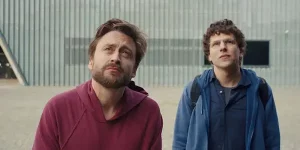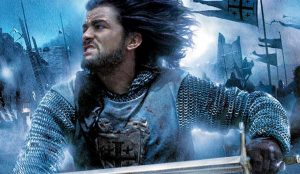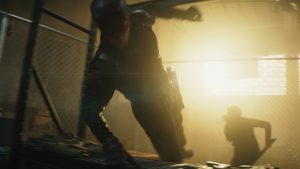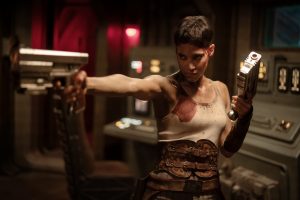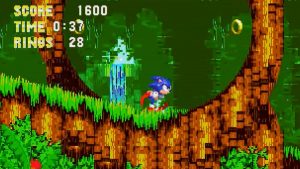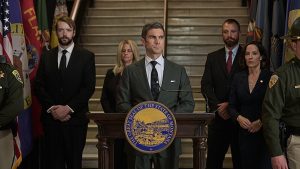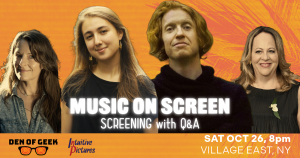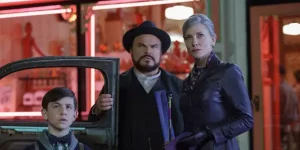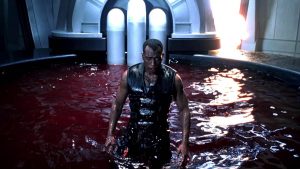
Back in the inauspicious days of 2020, the Glasgow Film Festival played host to a new feature film from Canada called James vs His Future Self. It was directed by Jeremy LaLonde and starred Daniel Stern (of Home Alone fame) and Jonas Chernick. It was the first of their movies to appear at the Festival, but certainly not the last. If you have been in and around the Glasgow Film Festival these last few years, the latter name will certainly be familiar to you. Chernick has become something of a staple at the Festival since 2020, returning no less than four times over five years. Directors and fellow actors have come and gone, but Chernick remains, returning each year with a new cast and crew. His admiration for the Festival, and the city itself, is clear.
My interview with Chernick – the second I’ve done with him after his feature Ashgrove in 2022 – was initially cancelled, as bad luck forced me to miss the press junket. Chernick, however, reached out and offered me an interview upon his return to Canada. This is emblematic of Chernick‘s character: generous with his time, helpful, and easily among the most down to earth and approachable of actors I’ve ever interviewed.
So it was that our interview took place over Zoom, with Chernick having returned to his native Toronto the day before. Throughout our discussion he is frequently funny, thoughtful, and insightful, as we talk movies, Canada, and the difficulties of making a film backwards.
Daryl MacDonald for Film Inquiry: So I watched The Burning Season with my wife, and she had some thoughts, particularly about the wedding scene, but I’ll come back to that!
Jonas Chernick: Yeah, I’d love to hear her thoughts! You know, as a filmmaker you either want a really positive response or, like, a very, very angry, negative response. You want reactions. It’s the fair-to-middling that feels kind of disappointing.
This is your fourth movie at the Glasgow Film Festival, right?
Jonas Chernick: Yeah, I’ve been to four editions of them in five years.
Four editions? So when are you buying a house here?
Jonas Chernick: [laughs] Maybe it’s in the cards! You know, every time I come back I love the city even more and find a new depth of affection.
source: North Banner Releasing
So, The Burning Season, with its reverse narrative structure, reminded me of the likes of Gaspar Noé’s Irreversible, or Christopher Nolan’s Memento. Was that your starting point when writing the script?
Jonas Chernick: Well, the original seed of the idea was something else. I co-wrote this movie with Diana Francis, and originally I had this other idea that I was noodling with, kind of like a Marriage Story/Scenes From A Marriage type dissection of a relationship. But we just couldn’t find it. We were gonna give up, then Diana came into a session one day and said “I have an idea. It’s way outside what we’re doing but what about a love affair, told backwards?” And that was all she said and we both just sparked on it.
So we started to integrate ideas from the previous script that we were writing, into this structure. But if we’re gonna tell a story backwards, then why are we telling the story backwards? How does it serve the theme? For me the movie is about secrets, and what happens to us when we keep secrets and how does it destroy us? How corrosive and explosive can these secrets become? It’s such an interesting way of investigating the notion of secrets when you’re looking at the ramifications or the result of those secrets.
And it’s a secret from the audience as well.
Jonas Chernick: Yeah! To see characters that are living in the aftermath of those secrets, but not know what those secrets are, and then you’re spooling backwards so in fact the secret that is the cause of all of this is in fact a secret to the audience just seems to me a really fascinating way of approaching that narratively.
So the more you see these characters’ behaviour the more you want to know what the origin story is. You wanna know what the catalyst was. What is the secret that they’re keeping? And then ultimately when it’s revealed at the end the hope is that it sheds new insight into it all and you recontextualise everything.
In terms of reference points, Sean (Garrity, director of The Burning Season) would say Irreversible. He likes to use that one. But for me it’s Memento and also a Harold Pinter play called Betrayal.
Oh, I haven’t seen that one.
Jonas Chernick: It’s a very famous backward story. When I was in University I did a play by Tom Stoppard called Artist Descending a Staircase. It was a radio play and we did it from the stage, but the structure of that play is that there’s five scenes and you begin with the first scene but you only do half the scene, then you go onto the next scene and you only do half of that scene, and so on, and when you get to scene five, you play it out and then you roll back to finish the second half of all the other scenes. It’s a really fascinating way of telling a story, so that was in the back of my mind as well
That is fascinating! Is that how you approached the script? Writing it backwards? In each chapter, I noticed, there’s sort of references, or breadcrumbs, to the next chapter, or rather the chapter before – sorry, this is going to get confusing.
Jonas Chernick: Oh I know! Trust me, I’ve got a whole thing on the wall!
So was there specific things you wanted in each chapter that would reward an audience paying attention to those little details?
Jonas Chernick: Yeah! Yeah, exactly! Sean and I would call it our parlour trick, which is that idea of referencing something in a scene between characters that we know has context in the backstory but the audience doesn’t know what it is, and so we’re referencing it in a way that’s intriguing and hopefully draws you forward and pulls you in.
So then in the next scene, which is of course the previous scene chronologically, we tip our hat to it so that it all threads together. The key in the writing and the editing was to not overplay that parlour trick because that could feel gimmicky, so in the edit Sean pulled a bunch of them back. I think as the writer I really wanted to put a bunch of them in because that’s the most fun, but in the end I think Sean pulled back the right amount. He pulled out my very favourite one but I think it was the right move.
There’s lots of little references that had me hooked – the whole thing with the mac and cheese for example, I really had to know what that meant! But I think your mileage may vary with audiences because, my wife for example, didn’t have much patience for not having context to the wedding sequence, and I guess there are some audiences won’t appreciate the process. Was that a risk you were conscious of going in?
Jonas Chernick: Well yeah, because we’re so conditioned to watching a film in a particular way, we’re so conditioned to having a narrative spelled out for us. I mean, I’m at fault as much as anyone because I’m a fairly conventional screenwriter and for me it’s all about: establish the character, build the story, build the narrative, increase obstacles.
All the stuff in all the screenwriting books, I’ve read them all. I’ve absorbed them, and I think it informed my writing in a way because I think it all makes sense and it’s a very comfortable kind of experience watching a movie that unfolds in that way. So to pull the rug out from under that and try something totally different can be disorienting, so I can understand your wife saying “I don’t understand the context” because it irks you in a way, because it’s not what you’re used to.
But if you’re patient, hopefully it ends up being more satisfying, because it challenges the audience, it challenges your intelligence, your problem solving, your deduction skills. Also it challenges your conventional understanding of a character’s journey, you know? We’re so used to seeing it begin at point A, go to point B, go to point C, but to flip it and start at point C and paint an intriguing picture, the question becomes how did we get here? What happened to bring us to this point? It was a challenge for Sean and Diana and myself to try and tell a story that way.
source: North Banner Releasing
Did you film it chronologically? How did you keep track of where your character was in the story?
Jonas Chernick: Well I would credit my good friend Sean – who actually came on very late in the process – for that because he insisted on shooting chronologically. He wanted to start with chapter one, where Elena and JB see each other for the first time, and then shoot chronologically through each chapter so that we’re not dealing with a lot of the gymnastics that you would assume we would be dealing with, which would have required all kinds of charts and graphs on my dressing room wall!
You mentioned Sean came in late to the project, and the last time you and I spoke you were working with Jeremy (LaLonde, director of previous Chernick movies James vs His Future Self and Ashgrove). Is it a different process working with Sean than it was Jeremy on your previous films?
Jonas Chernick: Sean and I are like old soulmates. We’ve made seven films together. Our first feature (Inertia) was back in 2001, and we’ve built this whole career together where sometimes we’ll co-write, or I’ll write and he directs, or he writes and directs and I act, so there’s a shorthand between us and we’re very familiar with each other.
Jeremy and Sean are totally different. It’s a very different process. But they are the two filmmaking soulmates that I continue to create with.
This is the first time you’ve worked with Diana Francis. What was that like?
Jonas Chernick: Diana came on because when I was writing this movie I knew that the protagonist was gonna be a woman and as much as I’m in touch with my feminine side Daryl, I felt like I needed a woman’s voice! Diana was so essential to the whole process, but especially with finding that voice of Elena and really making it authentic and very detailed and consistent.
Absolutely, Elena was a great character, and Sara Canning did so well at bringing her to life. How did she come aboard the project?
Jonas Chernick: Well we reached out to some actors that we knew to do some chemistry reads, and I think she was the first one that we read and everybody that we saw after her we were comparing to her. She just nailed it. I love Sara’s work, I’ve known her work for years. She’s a really interesting actor because she’s wide open, there’s an access to her, an openness. In real life she’s the sweetest, warmest person, but I love when she plays an edgier character or a character with secrets, because you juxtapose this warmth and inviting openness with something darker and edgier, with more barbs. I find the work becomes so compelling because you’ve got those two things playing together.
She’s also just an incredibly present, honest actor. She doesn’t hit a false note. We did another movie together that’s going to come out next year. Maybe it’ll come to Glasgow!
In my review I talked about the chemistry between the two of you, and how that was the most compelling aspect. The gimmick is sort of the artifice to draw people in, but that’s set dressing, right? You come for the gimmick but you stay for the characters.
Jonas Chernick: Yeah, you’re absolutely right. We knew that the backwards storytelling was just that, it was just set dressing. So we needed the chemistry, but it wasn’t just the chemistry between us, which was crucial, we also needed to have great chemistry between Elena and her husband Tom (Joe Pingue). You needed JB and his girlfriend Poppy (Tanisha Thammavongsa) to have great chemistry. It was very important to us that Poppy and Tom not be stock characters. We didn’t want to dismiss those characters. A lot of romantic films will put the supporting characters in as foil. Like, “oh you’re supposed to be with her, obviously, because look this other one’s such a dud!” and they make it really easy, right?
It’s the opposite here, because this movie suggests that perhaps JB and Elena should not be together. So we wanted to give the partners really significant roles and make those characters real candidates for the romance, and so of course chemistry was a huge piece of it.
I’m curious about your character, JB. The first time I ever saw you in a movie was James vs His Future Self, where your character is much more laidback – and you yourself strike me as a laidback guy – but I’ve noticed you tend to take on a lot of characters who are very dark, very broken in some way. I saw you last year in Rabbit Hole, for instance. I almost didn’t recognise you. Is that something you choose to do on purpose?
Jonas Chernick: Not really. I’m probably right down the middle. Half comedic, half dramatic. I bring both of those elements into everything I do. I guess I’m not interested in playing easy to like characters. I like challenging an audience by presenting a human character with flaws, who’s rough around the edges, and then trying to win your sympathy or keep you on side while I attempt to redeem the character.
I think if you look at all my films back-to-back, with the exception of James vs His Future Self maybe, all of my characters make very unlikeable decisions in the first act, and you could very easily write them off instead, but I’m interested as a writer and as an actor in presenting a character with human flaws and then showing the humanity of that character as they try to redeem themselves or make peace with what they’ve done. So I guess I keep coming back to that as a guiding principle, not by any design.
There’s a certain trust you put in your audience. Like “oh you’re not gonna like this character but follow me on this journey, we’re gonna tell it backwards”, and I think it’s probably not easy to do that.
Jonas Chernick: I think you get to a certain point in your career, if you find success, where you’re not able to take that risk. It’s too dangerous. You’re not gonna see Tom Cruise, Ryan Gosling, Brad Pitt, play those kinds of characters that start off doing horrible things. They can’t do it, it’s too much risk. But I’m really fortunate, being a working Canadian actor with some success behind me, but not being famous.
I did a couple movies with Kevin Pollack, and he told me once “I hear it’s lonely at the top but it’s just perfect right in the middle” and he’s obviously closer to the top than I am, but being where I am, being able to make films and tell stories, I don’t feel handcuffed by any particular kind of expectation. I can go ahead and play a guy that challenges your sympathies, and if I go too far and everybody hates the character then okay, my career is not over. I’ll work again. So that’s part of the artistic freedom I have being in the middle.
source: North Banner Releasing
It sounds comfortable in the middle. You can take risks and, I guess, be more of an artist.
Jonas Chernick: Absolutely, yeah. But you lose that when you’re beholden to shareholders that have an investment in you. I get enough money to make these movies look good but nobody’s looking too closely at what I’m doing in that regard. I’m comfortable here.
I mean, I did the LA thing for about six years in my late 20s, early 30s, and it was going okay, but I kept coming back to Toronto to make my own films. I was like, what am I chasing? I live in this amazing country, I have a career here, people are casting me to be in their films and TV shows. I do big American shows like Rabbit Hole, I do international projects – I went to Prague a few years ago to do a Philip Roth adaptation called The Prague Orgy – I realised there’s nothing I want more than that. It’s perfect. So I stopped chasing those dreams.
Now, that said, if Spielberg comes knocking, I’ll take the call!
I wanted to ask you about the younger versions of yourselves, and how similar they were to you and Sara. Did you have a hand in the casting?
Jonas Chernick: I mean, that was a perfect storm because when it came to casting the younger versions of Sara and I, we were doing these auditions and seeing actors, and I remember saying to Sean “of course you’re gonna cast actors who look like Sara and I, right?” and he said no. I’m like “what are you talking about? That’s part of the fun of watching a movie like this is when you flashback and see them as kids and you go ‘oh look at that, great casting!’ He’s like “No, I’m gonna cast the best actors for the role, and if they don’t look like you that’s fine, the audience will go with us”.
I panicked! I didn’t sleep for like a week. I was like, well, eye colour, you have to cast actors with the same eye colour, and he laughed at me and thought that was absurd! I said “but you have to! I have blue eyes, you’re gonna show a close up of this kid with brown eyes?”
So he sent me articles about certain medical conditions where your eyes change colour (laughs). Ultimately in the end the two actors he cast were the two best actors for the roles, their performances were incredible and they had chemistry, and they read together and it was perfect.
Luckily they happened to look like Sara and I and have the same eye colour. Pure coincidence! Sean would have cast anyone if they were the right actor for the part and we got really, really lucky that they did look like us.
Did they film first or was it you guys? Who was following who’s performance?
Jonas Chernick: We shot all of our stuff first. The final week was them coming in and doing their stuff and that finished the shoot, with the exception of the last day which was back to Sara and I. They came in late and observed us, they got to know us. We were all living in a very remote area, so it was very close quarters. So we’d spend quite a bit of time hanging out with them, sitting by the fire, playing guitar, having some beers and stuff, so they got to be around us, but they were not emulating Sara and me. They weren’t trying to mimic our gestures or reproduce anything. They just captured our energy. Ultimately it feels like there’s a really beautiful consistency between us.
That about wraps it up, but I really wanted to ask you where you filmed, because it was such a beautiful location.
Jonas Chernick: Come to Canada! That’s what it looks like everywhere in Canada! We shot in Northern Ontario, which is all forest and lakes and there’s a beautiful provincial park called Algonquin, that is untouched, there’s no development inside this park, no restaurants, no hotels. We shot at a summer camp, where the kids had left for the summer and gone back to their lives, and we took over the camp and obviously made it look like a cabin or cottage resort.
Well, look, thanks for your time Jonas. It’s been a real pleasure. I hope to see you back here next year!
Film Inquiry would like to thank Jonas Chernick for taking the time to speak with us!
Does content like this matter to you?
Become a Member and support film journalism. Unlock access to all of Film Inquiry`s great articles. Join a community of like-minded readers who are passionate about cinema – get access to our private members Network, give back to independent filmmakers, and more.
